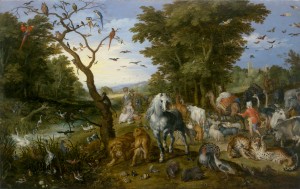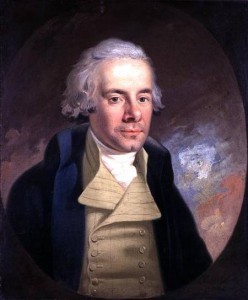Six mornings out of seven I wake up early to read the Bible, pray, meditate, and write. A friend recommended the Zondervan Today’s New International Version Study Bible, and I’ve been pleased with its abundance of resources that help me understand the context and meaning of books, chapters, and verses. It even has headings for each chapter and subheadings within chapters for quick orientation.
Recently I came upon a heading that made me do a double take.
It was the chapter heading for Genesis 9. It reads “God’s Covenant with Noah.” It was undoubtedly written by a scholar with far more theological education than I and was then reviewed by other scholars as well. Nevertheless, that heading misrepresents the clear articulation in the chapter of whom the covenant is with.
In the actual covenant section of the chapter (verses 8 to 17), we read as follows:
Then God said to Noah and to his sons with him: “I now establish my covenant with you and with your descendants after you and with every living creature that was with you–the birds, the livestock and all the wild animals, all those that came out of the ark with you—every living creature on earth. I establish my covenant with you: Never again will all life be destroyed by the waters of a flood; never again will there be a flood to destroy the earth.” And God said, “This is the sign of the covenant I am making between me and you and every living creature with you, a covenant for all generations to come: I have set my rainbow in the clouds, and it will be the sign of the covenant between me and the earth. Whenever I bring clouds over the earth and the rainbow appears in the clouds, I will remember my covenant between me and you and all living creatures of every kind. Never again will the waters become a flood to destroy all life. Whenever the rainbow appears in the clouds, I will see it and remember the everlasting covenant between God and all living creatures of every kind on the earth.” So God said to Noah, “This is the sign of the covenant I have established between me and all life on the earth.”
As a parent of three children that sounds to me like a parent doing what it takes to make sure a child gets something really important. Repeat. Repeat. Repeat.
What’s clearly important in this part of the story are two things: (1) the promise not to destroy all life by water again and (2) that those bound together by the covenant are God, Noah (and his descendants), and all of life on earth.

The Entry of the Animals into Noah’s Ark (Jan Brueghel the Elder, 1613) The J. Paul Getty Museum, Los Angeles
Yet, the heading reads “God’s covenant with Noah.”
The heading’s incompleteness is a painfully perfect illustration of the blind spot Christians have had as they’ve read the Bible for centuries. We’ve consistently overlooked and ignored clear references to God’s concern for all of life.
I don’t mean to suggest that there is no ambiguity in the Bible about how God’s earth is portrayed or, for that matter, about a number of other subjects. Nevertheless, I believe we see a relationship between God and all of life in the Bible that is compelling and real.
In the Genesis story, God sees all that he has made (including humans) and says it is all very good.
In Psalms 50:11 we read, “I know every bird in the mountains, and the creatures of the field are mine.” How intimate that connection is.
In Job, God points to the living world as a testament to his majesty, ineffable mystery, and power.
In Romans 8:22 we read that all of Creation is groaning.
In Revelations we read that “every creature in heaven and earth and under the earth and on the sea, and all that is in them” are singing and praising God and the Lamb.
I struggle here with whether I should dwell with anger and frustration on how Christians have ignored the thread of the significance to God of all Creation or whether I should dwell on how right and energizing it is to me that that there is this thread. Do I see the glass half full or half empty?
I’m going to take a different glass.
The reality is that, yes, Christians have missed the boat on many of the core messages of the Bible that stare us right in the face. We’ve had many holes in our gospel. Our faiths and lives have been lacking wholeness throughout history. We are all fallen beings and that has impacted the faiths and lives of Christians for over two millennia.
We’ve hated our enemies. We’ve hated our neighbors. We’ve hated other Christians because they believed different things. Christian nation has warred against Christian nation with utter ferocity. We’ve discriminated. We’ve allowed our countries and our economies to be our masters when God’s will contradicts what those masters call us to do. We’ve read verses in the Bible that are very clear and ignored them.
Yet, that doesn’t change what God’s wishes and intentions are. And over time, in sometimes halting ways, there has been progress around the world in some areas towards a more just and righteous world. The end of slavery and segregation are examples.
It’s time for this to happen much more fully with all of God’s life on this earth. It’s time to remember the complete covenant relationship marked by the rainbow.
This will not be easy. One of the reasons we’ve ignored Creation is that we must use it to survive, and for most of human history, survival has been a hard thing to do. It’s a radically challenging idea to think that how we interact with Creation (which we do continuously) must be given ethical scrutiny, that God’s earth is part of our ethical universe. And we find it so easy to be drunk on our own power and creativity as we shape God’s earth for our purposes.
In fact, in the glory of our astounding capacity today to reshape the world to our purposes, we are tempted to make ourselves the measure of all things. We want to be gods. We love being gods.
Having a faith that is truly centered on God and has concern for all of Creation would compel us to rethink much of our lives and our economies. It would cause us to be radically humble and accepting of limits on what we do for the good of all life on earth.
We don’t want to go there.
We need to go there with God’s help and grace.





